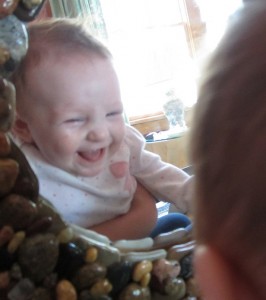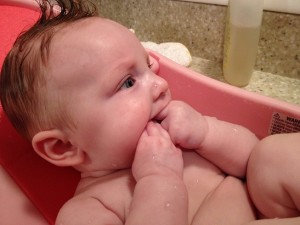Put a dog in front of a mirror and he has no interest in looking at himself. But put a 4 month old baby there, and she lights up with excitement.
Emerald can’t rejoice enough at her reflected duplicate. Somehow at this early age she’s figured out that the face in the mirror will change in response to her smile. She’ll grin and giggle at her grinning, giggling reflection until we get tired of holding her up to the mirror.
 |
 |
 |
This charming phenomenon seems to be universal with babies. They’re social beings from the very beginning, genuinely appreciating the responsive expressions of others. There’s only one source for this: the Creator himself. As he “knits them together in their mothers’ wombs” (Psalm 139:13), part of what he does is install a people-oriented piece that causes babies to relate to other faces.
Emerald has the sense to know that if you smile at someone, they’ll smile back at you. Daily she tests it in the mirror, and it works 100% of the time. The same thing happens when she smiles at us. We can’t help but smile back at her.
Why is that? Scripture gives us the answer: “A cheerful look brings joy to the heart.” (Proverbs 15:30) God wired each of us to respond to what we see. And if I would scowl at Emerald, she wouldn’t smile back but might look puzzled or even turn her lower lip down and start to cry.
God watches us closely, and that includes our facial expressions. He’s made our features unique, and the way we use them to express ourselves is probably of interest to him. Surely he’s pleased when we give smiles and “cheerful looks” to others, since it brings them joy as Proverbs says. And beyond all doubt he’s gratified when we turn toward him with a pleasant expression.
But we should check ourselves on that. As we approach Bible reading or church attendance or a prayer time, do we do it because we feel we should? Or because we feel guilty when we don’t? Or do we do it with joy, looking toward the Lord with an expectant smile? Our expressions reflect what’s in our hearts, and the question that should weigh heavily on all of us is, “What will God reflect back to me if I look toward him with dreary obligation or a sense of false guilt?”
Scripture tells us that just as Jesus was a reflection of his Father, we’re to reflect Jesus, not just in facial expressions but in what we do, where we go, who we’re with, what we wear, what we eat, what we think… all of it.
If we can learn to do that, we can be sure he’ll smile back at us.
“Just as water mirrors your face, so your face mirrors your heart.” (Proverbs 27:19)







